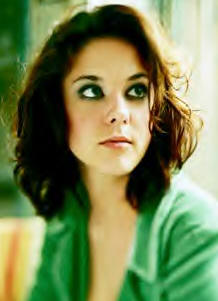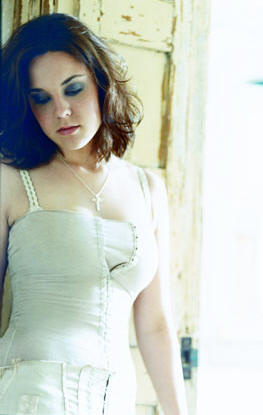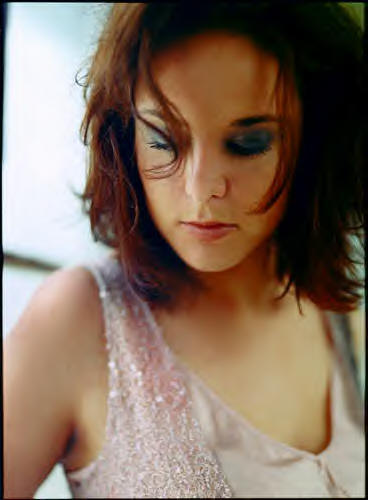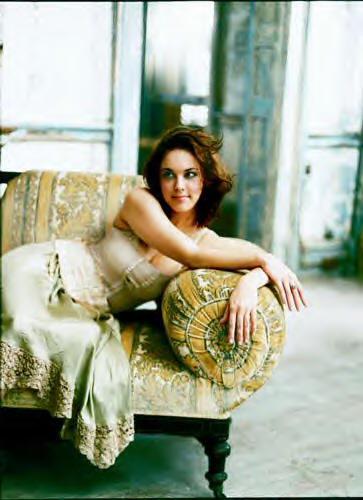

PopEntertainment.com >
Feature
Interviews - Music >
Feature Interviews K to O >
Anna Nalick
 Anna
Nalick
Anna
Nalick
Breathtaking
by Jay S. Jacobs
Copyright ©
2005 PopEntertainment.com. All rights reserved.
Posted:
March 24, 2005.
You can
thank Anna Nalick's grandparents. They may not be responsible for the
talent that the surprisingly mature young singer/songwriter shows on her
gorgeous debut album Wreck of the Day, but they helped to plant the
seed.
Nalick
grew up hearing show biz tales from her grandparents, who were stage
performers in the early 1900s. While they were never stars, Anna's
grandmother worked with the likes of Fred Astaire and the Marx Brothers.
So even as a young girl, Nalick was seduced by the power of performing, the
power of the stage. As she grew older, Nalick realized that music was
the outlet to reach this dream.
Nalick made some very lo-tech demos on a
girlhood toy tape recorder. The sound quality wasn't pristine, but it did
capture the ears of some producers.
Christopher Thorn
and Brad Smith (surviving members of 90s rock
band Blind Melon, who had a huge hit with the song "No Rain") and Eric Rosse
(who co-produced ex-girlfriend Tori Amos' first two solo albums and more
recently worked on Lisa Marie Presley's debut) liked what they heard
and got Nalick into the studio to record some demos. These turned out to be
so good that major labels soon started circling. Nalick signed up with
Columbia Records and started working on her debut CD with
a respected group of studio musicians including Smith, Thorn, Rosse, Zak Rae
(Alanis Morissette, Macy Gray), Lyle Workman (Sheryl Crow, They Might Be
Giants), Stuart Mathis (Jewel), Joey Waronker (Johnny Cash, Beck) and Matt
Chamberlain (Tori Amos, John Mayer.)
The finished product is a wonderfully
assured musical statement for a woman of only twenty.
"Breathe (2 A.M.),"
the opening song (and first single) is a
lovely meditation on loneliness that
could definitely become a huge left field hit along the lines of Vanessa
Carlton's "A Thousand Miles" if some adventurous program directors just give
it a chance. The delicate title track is a wonderfully resigned
love-gone-wrong ballad in which she defies her heart saying, "if this is
giving up, then I'm giving up on love." More upbeat songs like "Paper
Bag" and "Satellite" soothe the pain with Nalick's confident vocals sounding
like those of a pro who has been recording for years.
A few
weeks before the official release date, the buzz has already started to
grow. "Breathe" is starting to get some airplay. Nalick's music
is being used on TV. Her face is even showing up on a coffee package.
At this moment, on the precipice of her dream, Nalick took a little time out
to sit down with us to discuss the album and the road leading up to it.
You often hear of musicians whose parents were artists. Your story is a
little different, it was your grandparents
who were the performers.
Did you always know you were going to get
into music?
Not
necessarily into music, but… I didn’t get to see them when they were
performing, but I heard a lot of their stories and it inspired me to want to
travel and to want to entertain people. Of course, when they were
performing, it was during the great depression… Entertainment was the
way to get people out of whatever their
current situation was. Give them a few hours to just disappear into
another world of laughter and music. I liked that.
Early on in your career you were the lead singer of a Rush cover band and a
heavy metal group. That’s a far way from your current music. Do the
those influences ever creep back into your work,
like, for example on “Bleed”
which is rockier than most of your other songs?
No.
Definitely not. I was in a metal band in high school. I wrote
music for that. I wrote music for a local ska band. I just like
writing music for whatever the genre... When I was in the Rush cover
band, it was actually as a means for trying me
out; to see if I was good enough to be in these guys band. It ended up
I only played a few shows and I couldn’t do it anymore. It started
affecting my writing in a negative way. Because I write counter to the
bass line. The melody line in Rush music follows right along with the
bass line.
You started writing and recording on a Rainbow Brite tape recorder. Were
your early demos done on that? How was the sound quality?
It
wasn’t amazing quality, but that was all I had. That was my only means for
recording things. I didn’t know any better. Of course, we didn’t send
cassette tapes to record companies. I quickly had a CD that I made with
Christopher Thorn, Brad Smith
and Eric Rosse. (But) Yeah, that was what I
started on, the Rainbow Brite cassette player.
That’s cool. Maybe someday it’ll end up on eBay or something like that…
You
know what, it is hidden somewhere in my closet. I don’t even know where it
is. (Laughs)
You just mentioned Chris and Brad and Eric. You’ve
cited Tori Amos as a big
influence. What was it like working with Eric, who co-produced her albums
Little Earthquakes and Under the Pink?
Well,
I really like the way that he produces records. Of course, I knew a little
bit of what his style is based on the things he did with Tori. He’s just
got a really great feel for music and the direction that a song should go
in. Of course, when I wrote all my songs on guitar and piano, they were
very simply done. But I knew what I wanted from the bass, the drums, the
cello, whatever we were using. He gave me a lot of creative control, along
with his ideas for what the song should sound like fully produced.
Well, also Chris and Brad were members of Blind Melon, a band you were also
a fan of. How were they to work with?
They
were a lot of fun. Especially having the musician background, they came
from a different perspective in production. And I loved Blind Melon growing
up, so it was great to work with some of my biggest influences.
Other than Tori and Blind Melon, who were some of the other bands that
inspired you to take up music?
I
listen to a lot of Frank Sinatra. I love old Gershwin tunes and Billie
Holiday. And Ella Fitzgerald. I like a lot of the old jazz standards.
Right now I’m listening to Switchfoot. They’re very good. Also, there’s an
artist called Ari Hest who I toured with. He has
a song called “Anne Marie” that I really like. I
like to listen to whatever’s out. Right now I like Keane
and the Killers and Jet is really cool. So… I love music. I like it all.
One
day you’re a college student, and the next you’re working on an album with
all these professional musicians that you’ve been hearing for years…
Actually, (it was) not one day and another. It was all at the same time.
(Laughs) I was going to college, I had two jobs and I was driving
out to Hollywood every day to produce the records that we sent to record
companies. So it was very, very busy. And kind of a little bit of a
culture shock. To all the sudden be flying to New York
and still have homework to do back home.
One thing that’s really cool about your music is that while you do have a
range of influences, you always give priority to having a good melody. How
do you go about writing a song?
Well,
I think for my songs, I want them to have a very classic sound to them.
Something that a lot of people can relate to. Writing for me is very
healing. And also a means of communication. I think a strong melody is
important, but I put most of my focus into the lyrics. That’s my favorite
part of writing.
Now, you say writing is very healing for you, but in “Breathe (2 A.M.)” you
do say in the lyrics that while writing you “feel like you’re naked in front
of a crowd.” Is it hard sometimes to open yourself up to that kind of
scrutiny?
I
wouldn’t say it’s hard to, because that’s all I’ve ever done, but I do
realize that I’m making myself vulnerable to a lot of people. That’s been a
blessing in a lot of ways, because it’s helped me to realize that there’s
really nobody I need to scared of, nobody who should be intimidating to me.
Because I don’t know that I’ve ever met anyone who hasn’t experienced love
gone bad, or hasn’t experienced heartache, or even falling in love. So it’s
a way of connecting to a lot of people.
In
“Breathe,” which by the way I think is a great song, was the “boy who turned
21 on the base of Fort Bliss” based
on a real person?
Yeah,
it was actually. He’s 24 now and married and has a baby.
In
your bio, you say that “Citadel” is the song that is most autobiographical.
How so?
Well,
“Citadel,” as well as all the songs on my album, has taken on different
meanings as the years have gone by. I wrote most of them when I was about
eighteen or nineteen. I turn twenty-one tomorrow…
 Oh,
Happy Birthday…
Oh,
Happy Birthday…
Thank
you. (Laughs) So, it’s been a while since I wrote them, but they
continue to take on new meanings.
“Citadel” in particular is just a song about sometimes being afraid to jump
in with both feet. While a part of me is ready to be a big kid and that’s
been… (laughs) I was going to say that’s been legit. I’m sorry,
that’s a word that my brother uses. That said it definitely made sense in
relationships and in business.
How do you find inspiration to write?
I
guess it depends on what I’m inspired by. I never feel a lack of
inspiration to write. There’s always something to write about. I never
feel like I’m missing it. I could probably write a song just about any time
and it’s always going to do something good for me. I’m lucky that other
people care to listen.
About a month ago I heard “Satellite” on the TV series
Joan of Arcadia. How did that that come about? Did you
hear it? If so, was it one of the first times you heard you music in some
other venue than just playing it yourself?
I
didn’t hear it, because I was actually playing a show that night. I think I
have it recorded somewhere. I started getting offers to have my songs
played in movies and TV shows as soon as the album was finished… actually
even a little bit before. Joan of Arcadia was the first one we said
yes to, because I actually went to school in Arcadia. I was born in Arcadia.
I grew up there. It was too good to pass up.
Did you know that you’d made it when your face showed up on a coffee
package?
That
was actually one of the most exciting things. Because I’m a coffee lover
and… (laughs) and I thought that was cool. Absolutely a great
promotional tool. I give thanks to whoever it was at the label that came up
with that.
Email
us Let us know what you
think.
Features
Return to the features page
